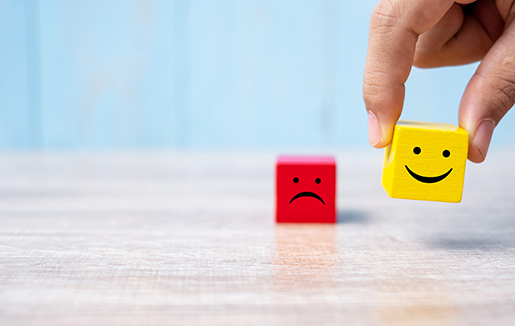
The COVID-19 pandemic is undoubtedly a stressful, anxiety provoking time for all. Trying to juggle all of life’s responsibilities during this time is seemingly impossible and the accompanying stress is often difficult to manage. Now more than ever, it is critical for working professionals to implement a positive self-care routine to manage stress in order to improve our mental health and overall wellbeing.
While it is natural to focus our attention on the logistical stressors associated with the pandemic (“Will I ever be able to find more toilet paper?” “My food supply is running low!” “How am I going to get on my Zoom call for work and help my 8-year-old with his virtual schoolwork at the same time?”), it is important that we don’t put our own mental health on the backburner. By neglecting our own needs, we aren’t prepared to be our “best self” to handle the inevitable stress that we are faced with during this time. In addition, those of us who are parents need to keep in mind the importance of modeling healthy and positive ways of coping to our children.
First and foremost, it is critical to be on the lookout for “warning signs” of mental health or adjustment issues in both yourself and your loved ones. Potential indicators of deeper mental health issues may include increased avoidance or withdrawal from family and friends, sleep difficulties (either lack of sleep or excessive sleep), feelings of restlessness or hyperactivity, difficulty maintaining attention, increased agitation or frustration resulting in a short temper, and increased feelings of worry, anxiety, apathy, or sadness. If you notice any of these signs, or observable changes in behavior, it is important to implement a coping or stress management plan. Here are some helpful tips:
Take care of your basic needs first. Do your best to fulfill your basic physiological needs first. Get adequate sleep, eat three meals a day (and cut down on mindless snacking!), and implement a simple exercise routine. Be thoughtful and intentional about how you treat your body, especially during this time. Without physical health, our mental health doesn’t stand a chance.
Set up a routine and stick to it. Structure and predictability are critical during times of uncertainty. Create a schedule for yourself and your family and stick to it (hint: visual schedules are great for those of you with kids). Try your best to maintain a set wake-time. Designate a comfortable work area for yourself (one that is free from distractions). To the best of your ability, end your work day and set aside some relaxation time. Make your weekends feel special. That might mean saving your favorite board game or Netflix show for Saturday. This will help give your week a sense of flow, improve your motivation, and will also help prevent that question we have too often been asking ourselves…“what day is it?!”
Find time for joy. Build in daily opportunities for pleasure and joy. This doesn’t mean that every moment of the day has to be “fun,” however there should be daily opportunities that bring you comfort and boost positive emotions. For example, take a hot bath, try out a new recipe, stream the music of your favorite artist while you work (Ed Sheeran, anyone?). These are the quick-fixes that will keep you moving through your day and reduce the chance of burn-out or stress.
Practice meditation and mindfulness (no really, try it!). Now is a great time to make mindfulness and meditation an integral part of your day. Mindfulness practices are all about learning how to gain control over our thoughts and attention. Research shows that the benefits of mindfulness and meditation are abundant: improved happiness, lowered stress levels, better attention, the list goes on and on. Just like any type of exercise, you need to practice mindfulness frequently in order to get good at it. Try a mindfulness exercise each night before bedtime. There are tons of apps available. Calm and Headspace are currently offering free resources during the COVID-19 pandemic.
Build mastery. Set a goal list for yourself and start checking things off your list. Achieving your goals helps build a sense of mastery and competency. In turn, this helps increase our positive emotions. Now is a great time to brush up on a new technology, work toward a certification, or take an online class.
 Find the silver lining. It’s hard to believe it now, but there are some positive things that will come out of this experience. Once the dust settles, it will be easier to understand the lessons that the COVID-19 pandemic has taught us. Think about all the time you have to build, repair, and strengthen relationships with loved ones that you are quarantined with. It’s also an excellent time to work on establishing a better relationship with yourself. Make lemonade out of those lemons! And express gratitude in what you do have with you during this time (more time with your family, home cooked meals, sunny days…).
Find the silver lining. It’s hard to believe it now, but there are some positive things that will come out of this experience. Once the dust settles, it will be easier to understand the lessons that the COVID-19 pandemic has taught us. Think about all the time you have to build, repair, and strengthen relationships with loved ones that you are quarantined with. It’s also an excellent time to work on establishing a better relationship with yourself. Make lemonade out of those lemons! And express gratitude in what you do have with you during this time (more time with your family, home cooked meals, sunny days…).
Limit your media consumption. Be particularly mindful of your media intake. Excessive media exposure can lead to increased worry and catastrophic thinking. Be informed, but don’t overindulge in news reports. Stick to objective sources grounded in science, like the World Health Organization (WHO) or the Centers for Disease Control (CDC).
Maintain physical distance, not social distance. It is absolutely critical to follow the mandated regulations regarding physical distancing. However, don’t confuse this with social isolation. Although you may not be able to physically stop by a colleague’s desk or visit friends and loved ones during this time, take advantage of technology to keep in contact. Make future oriented plans. Host a virtual happy hour with your coworkers, plan an online poker night with your buddies, set up a Facetime playdate for your kids. Remember, continued social interaction is one of the best ways to prevent feelings of loneliness and depression.
Be kind to yourself. In the midst of caring for others, make sure to put aside time for yourself to recharge your own internal battery. Take a break when you feel like you need one. Be realistic about what you are capable of achieving. It’s okay not to be working 24/7 or to make every zoom call. Nobody is perfect. These are challenging times and it is 100% okay to make a mistake, slip up, or let your emotions get the best of you. As long as you recognize when it is happening, take a deep breath, and give yourself a break and an opportunity to start again, you will be okay.
A healthy, positive mental attitude can have a big impact on our relationships with customers, colleagues, family and friends. Do the best you can with what you are given. You got this!
Deanna Spoto, Psy.D. is a licensed child, adolescent, and family psychologist. She is currently employed as a school psychologist and also works in private practice in Westchester County, NY. Dr. Spoto provides therapy and support to families as they navigate life’s challenges. For more information about her services, visit her website at https://www.deannaspotopsyd.com/.
For more information on coping with the impact of COVID-19, listen to the podcast with Dr. Deanna Spoto and visit CompTIA’s COVID-19 Resources Forum.

 Add CompTIA to your favorite RSS reader
Add CompTIA to your favorite RSS reader

